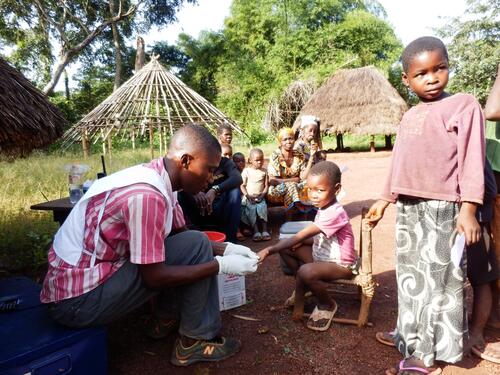The international medical humanitarian organisation Médecins Sans Frontières (MSF) has just completed a five month project to combat sleeping sickness in the Democratic Republic of Congo, during which more than 16,000 people were screened for the disease. The results show a low prevalence of the disease in the Bili area, in northern Orientale region, where no parasitological cases were found in those screened.
Sleeping sickness, or Human African Trypanosomiasis (HAT), is a parasitic disease occurring in parts of Central and Western Africa and is transmitted through the bite of the tsetse fly. If left untreated, the neglected tropical disease is fatal. DRC is home to 80% of all reported cases of sleeping sickness, and Province Orientale, where the screening was carried out, is considered to be one of the most active areas in the world.

From March 2013 to August 2013, the team travelled hundreds of kilometres targeting villages in the two districts of Haut and Bas Uele, where sleeping sickness rates have historically been high. The project posed a number of logistical challenges including weeks of travel by motorbike carrying a mobile laboratory, including microscopes and centrifuges through dense forests to reach people in remote areas. Sensitisation campaigns were held in communities beforehand to encourage people to come to the screening sites.
“Beyond the logistics, making sure we had good coverage was a challenge. For many, especially farmers and fishermen, coming to the screening meant they had to stay in town for the day instead of going out to work. It was really important to sensitize this group because farmers and fishermen are the most at risk of being exposed to tsetse flies, which gather on rivers and in farming areas,” said MSF laboratory technician Barrie Rooney.
Although the project was focused primarily on sleeping sickness, the team also wanted to contribute to treating other life threatening diseases. To gain acceptance amongst the population, and to fill the health care gap in the region, an emergency room with five beds was opened in the Bili Hospital during MSF’s presence in the region. 94 were admitted and treated. And, because malaria is endemic in the area, MSF teams also provided outpatient testing, consultation and treatment for the disease at the local Bili hospital. During active HAT screenings pregnant women and children under the age of five were tested for the disease. Patients who were diagnosed with complicated or severe forms of malaria were referred to the hospital in Bili. In total, MSF teams tested 4,309 people for malaria. 77% of those under the age of five tested positive. 69% of those tested, over the age of five, were also found to be carrying the disease.
“The aim of the team was to go where no one else had been to test and treat for sleeping sickness. And while the results were good news for the people of Bili town, in that there were no cases, we know there are still people dying of the disease and our goal is to continue to find them and treat them." said MSF medical doctor Katharina Totz.
MSF has been actively engaged in controlling and treating sleeping sickness for the past 25 years. Recently, MSF implemented a new approach to tackle sleeping sickness – the Mobile HAT Team. The international team, made up of laboratory technicians, medical doctors, logisticians and project coordinators, work together with national doctors, nurses, laboratory staff, logisticians and community outreach workers, in countries with a high prevalence of sleeping sickness to implement active village screening and treatment, along with training, surveillance, and advocacy. The aim is to save lives and work together with national programmes toward sustained elimination of the disease. So far, the team has worked in the Democratic Republic of Congo, Central African Republic, Republic of Congo and South Sudan. MSF also plays an important role nationally and internationally advocating for increased access to diagnosis and treatment and pushing for better research and development for this neglected disease.


